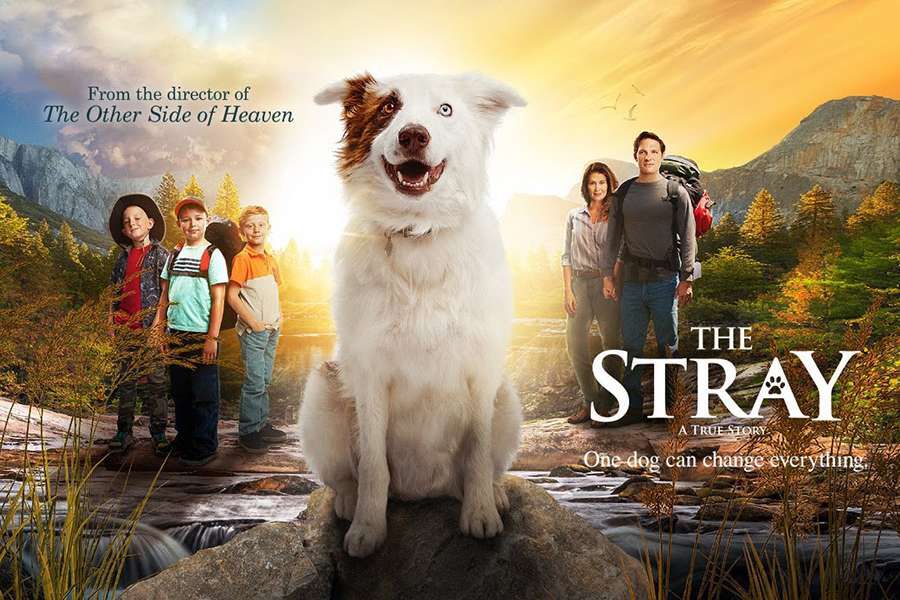Mitch Davis had the best intentions for his career and family life. He was an executive at the Disney and Columbia movie studios in the 1980s. He wanted to make family films, and he made the effort to be home around his kids, while many Hollywood colleagues logged countless extra hours at their offices.
But Davis was stressed at work and at home. He felt compelled to help make crassly commercial movies to boost the studios’ profits. He also frequently found himself wearing noise-canceling headphones to block out the sound of his children as he read a never-ending pile of scripts in a corner of his house. Something had to change.
The catalyst for improvements came in the most unlikely way: with the arrival of a stray dog at his home. Taking in a canine visitor they named Pluto, Davis found that its joyous presence had a profound effect on all their lives, and the transformation Pluto inspired forms the basis of his new movie “The Stray,” opening nationwide this weekend.
“That dog first started healing our family, and then saving it when we were struck by lightning on a camping trip,” says Davis. “There are two strays in the movie actually, the stray dog and the stray dad. I was headed in the wrong direction. There’s nothing like a bolt of lightning to center your priorities, and the dog reminded us what mattered most, and that was people and the members of our immediate family.”
Davis has been pleasantly surprised by how favorably early viewers have responded to “The Stray,” which was originally supposed to open on just 100 screens nationwide. After executives at Pureflix — the Christian-run film distributor that also handled the smash hit “God’s Not Dead” — saw it, the company immediately signed on to provide a broader release in more than 600 theaters. He feels that showing the positive impact that dogs have on families is a universally relatable theme since “dogs have a way of loving everybody unconditionally.”
Davis first asked his wife if they could buy a dog for their family, but due to their financial stress, she said he couldn’t bring a dog home on purpose. “She said we could maybe keep a dog if I found a stray, and that might have tipped her hand because a couple weeks later, Pluto followed our oldest son home from school and never left,” recalls Davis. “In our life, the stray dog was an angel.”
“What happens and changes when you get a dog?” he continues. “You start going on walks, and you choose parks and places you can hang out with your family. What happens when you come home at 2 a.m. and your dog is waiting for you? It’s always ready to look at the stars with you.”
Essentially, Davis sees dogs as a reflection of God’s own unconditional love for us. He says that dogs forgive and forget any slights against them, they have innate ability to determine whether motives are good or bad, and they have a keen understanding of human emotions. Davis’ dramatic relationship with Pluto and his incredible tale of surviving a lightning strike are at the center of the family film. Those qualities are in line with the other films he has made in the past 30 years, since Pluto touched his life.
“[Legendary director] Frank Capra once said that the morally courageous should be allowed to speak to their fellow man for two hours in the dark via movies,” says Davis. “What do we do when we go to a theater and walk into a dark room and allow a complete stranger to preach to us, teach us, or shock us? There’s really no other experience like it.”
“If your children came and said ‘I’m going to a stranger’s house to sit in the dark for two hours,’ you’d call the cops, but people do it everyday,” Davis continues. “We allow the complete strangers of television into our homes to teach us in the dark. It’s a serious responsibility and one I don’t think many take seriously today.”
Davis feels that most of Hollywood’s film output has only gotten worse since his crisis of conscience 30 years ago. He believes that as Hollywood has allowed budgets to grow astronomically, the studios have become more soul-less and driven to succeed internationally with films appealing to viewers’ basest instincts. But he still sees hope, and is determined to be part of that.
“There’s a crying need for films and family entertainment and we’re hoping this little movie of ours provides just that for as many people as possible,” says Davis. “Thirty years ago is when I quit my job and sold my house to move to LA and go to USC film school. To have a movie coming out 30 years later about that period of my life, about my family and my desire to make family movies, is layers upon layers of irony. But it’s a true story and one that will hopefully entertain and inspire lots of others.”

